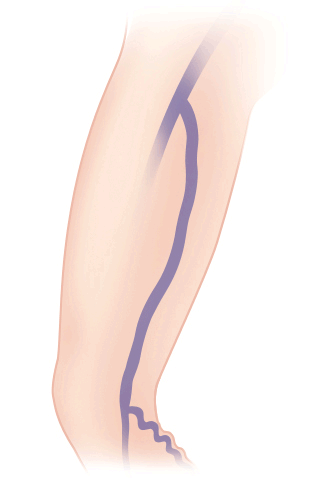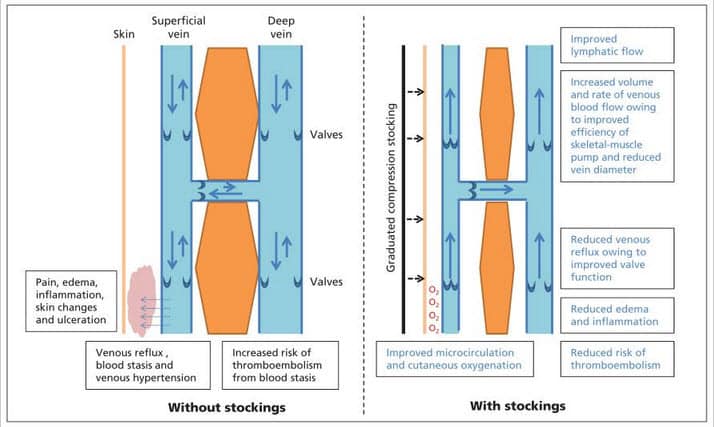Varicose veins can be treated with a minimally invasive, non-surgical, in office procedure called ClosureFAST for resolving venous reflux and varicose veins. ClosurFAST, uses radiofrequency energy to seal the vein from within. This stops the reflux and eliminates painful symptoms. Ultrasound guidance is used throughout the procedure to visualize your superficial venous system and direct a tiny catheter into the diseased vein to gently heat and seal the refluxing vein segment(s).
After the vein is sealed shut, blood then naturally reroutes to healthy veins. The treated veins will shrink over time and be absorbed by the body.

-
Minimally Invasive Outpatient Procedure.
Closure catheters are inserted into the vein via a tiny incision in the lower leg, eliminating the need for groin surgery and general anesthesia. The Closure procedure can be performed using local anesthesia in a physician’s office, as well as in an outpatient hospital setting or surgery center.
-
Clinically Proven Less Post-Operative Pain.
The Closure procedure does not involve pulling the diseased vein from the thigh as with vein stripping surgery, or using 700° C laser energy which boils blood to occlude a vein as with endovenous laser (EVL). In the RECOVERY Trial, a multi-center head-to-head comparative randomized trial comparing the Closure procedure with EVL, the Closure procedure was found to have less patient pain and less patient bruising than EVL for the best patient recovery experience available from a minimally invasive vein treatment. Additionally, in other randomized comparative studies have shown that patients receiving the Closure procedure return to normal activity and work significantly faster than those receiving vein stripping.
-
Excellent Clinical Outcomes.
The ClosureFAST catheter, which represents the latest advancement in the Closure procedure, has been shown in a multi-center study to have a 97.4 efficacy rate at one-year.11 This shows that the treatment is highly effective and, as proven in the RECOVERY trial, is gentle on the patient.
-
Cosmetically Appealing.
Because treatment with Closure is minimally invasive and is catheter-based, it results in little to no scarring. As with any medical procedure, you are encouraged to review all safety information associated with the procedure by consulting your physician.
Schedule Your Vein Treatment Consultation
Give us a call or fill out our contact form today!
In a head-to-head trial versus laser and stripping, the Radiofrequency Venefit Closure Procedure provided the Best Patient Recovery Experience and Outcome.
Excellent Clinical Outcomes
The ClosureFast catheter has been shown in a prospective, international multi-center study to be 93% effective for varicose vein treatment at three years using Kaplan Meier analysis.
The RF Ablation procedure is performed as a medical necessity as diagnosed by a trained vein specialist. It is not a direct treatment for spider veins or cosmetic issues, However successful treatment would produce significant cosmetic improvements.

Potential Side Effects
Although, radiofrequency ablation of the veins is considered to be a very safe procedure, this like any other procedure may have some potential risks, which we try to minimize. The most important complication risk is deep venous thrombosis (DVT). However, since this is a known phenomenon we have a number of preventive steps that if were followed well the risks would significantly be minimized. Other less serious but potential risks include cellulitis/infection, skin burn, some blood loss, bruising, mild pain and numbness/tingling in the treated area. In our experience, majority of our patients have enjoyed a wonderful benefit by undergoing this minimally invasive procedure.
Contact us today to schedule your Las Vegas Varicose Vein Treatment.
Graduated Compression Stocking
The use of compression is a conservative measure. It does not cure varicose veins of the legs, although it may relieve symptoms and prevent worsening.
Types of compression stockings
Graduated or medical compression stockings
-
Graduated compression stockings exert the greatest degree of compression at the ankle, and the level of compression gradually decreases up the garment
-
They are often used to treat chronic venous disease and edema
-
They are designed for ambulatory patients and are manufactured under strict medical and technical specifications, including consistency and durability, to provide a specific level of ankle pressure and graduation of compression
Antiembolism stockings
-
Antiembolism stockings are used to reduce the risk of deep vein thrombosis
-
Like graduation compression stockings, they provide gradient compression
-
They are designed for bedridden patients and do not meet the technical specifications for use by ambulatory patients
-
Although the terms “antiembolism stockings” and “graduated compression hosiery” are often used interchangeably and both types of stockings offer graduated compression, they have different levels of compression and indications
Nonmedical support hosiery
-
Nonmedical support hosiery, including flight socks and elastic support stockings, are often used to provide relief for tired, heavy and aching legs
-
They usually exert considerably less compression than graduated compression stockings
-
The compression is uniform and not graduated
-
They do not need to meet the strict medical and technical specifications as those of graduated compression stockings
-
They can often be bought over the counter without a prescription
Reference:
https://www.ncbi.nlm.nih.gov/pmc/articles/PMC4081237/
Gloviczki P, Gloviczki ML. Guidelines for the management of varicose veins. Phlebology 2012;27(Suppl 1):2–9 [PubMed]
Varicose veins in the legs: the diagnosis and management of varicose veins. London (UK): National Institute for Health and Care Excellence; 2013. Available: www.nice.org.uk/guidance/index.jsp?action=byID&o=14226
Nelson EA, Bell-Syer SE. Compression for preventing recurrence of venous ulcers. Cochrane Database Syst Rev 2012;(8): CD002303. [PubMed]
Schedule Your Vein Treatment Consultation
Give us a call or fill out our contact form today!
